2023 continued to be challenging for us all, particularly for the more vulnerable among us. The changes that we faced because of the Covid-19 pandemic and the resulting lockdowns are still being felt across our sector. This, combined with the biting cost-of-living crisis, has meant tough times for our clients, and many of our staff too.
This Impact Report takes a look back at the last year, picking out some inspiring stories and highlights and focusing on telling our collective story of how we built our resilience as a staff group and supported our partners and of course our clients to do the same.
The golden thread running through this narrative and collection of stories is about succeeding together. As one of our five core values, succeeding together is fundamental to everything we do.
We’re at our best when we work together – staff, clients, carers and partners – making the most of each other’s talents and strengths.
Operating across Bristol, North Somerset, South Gloucestershire (BNSSG) and into Bath and North-East Somerset (BANES) and across all of Somerset, we cover a large part of the South West region. We also deliver a wide range of services, more than 25, from our suicide prevention service, Hope, in BNSSG, to the Rehabilitation Team supporting people throughout Somerset.
Internally our focus is four-fold as laid out in our Strategic Plan to:
Build an inclusive culture with a continued priority to root out racism across the organisation.
Embed our psychological, adversity and trauma-informed approach in all our interactions and all the work we do.
Value lived experience at every opportunity to ensure our clients’ voices and views are heard and acted upon.
Create an enabling organisation where everyone contributes as fully as they can to improve our services and support the system as a whole to improve too.
Externally we are taking this inclusive, enabling and trauma-informed approach to the work we’re doing with our clients, to support the partnerships we’ve built with organisations across the system and to help positively change the system as a whole.
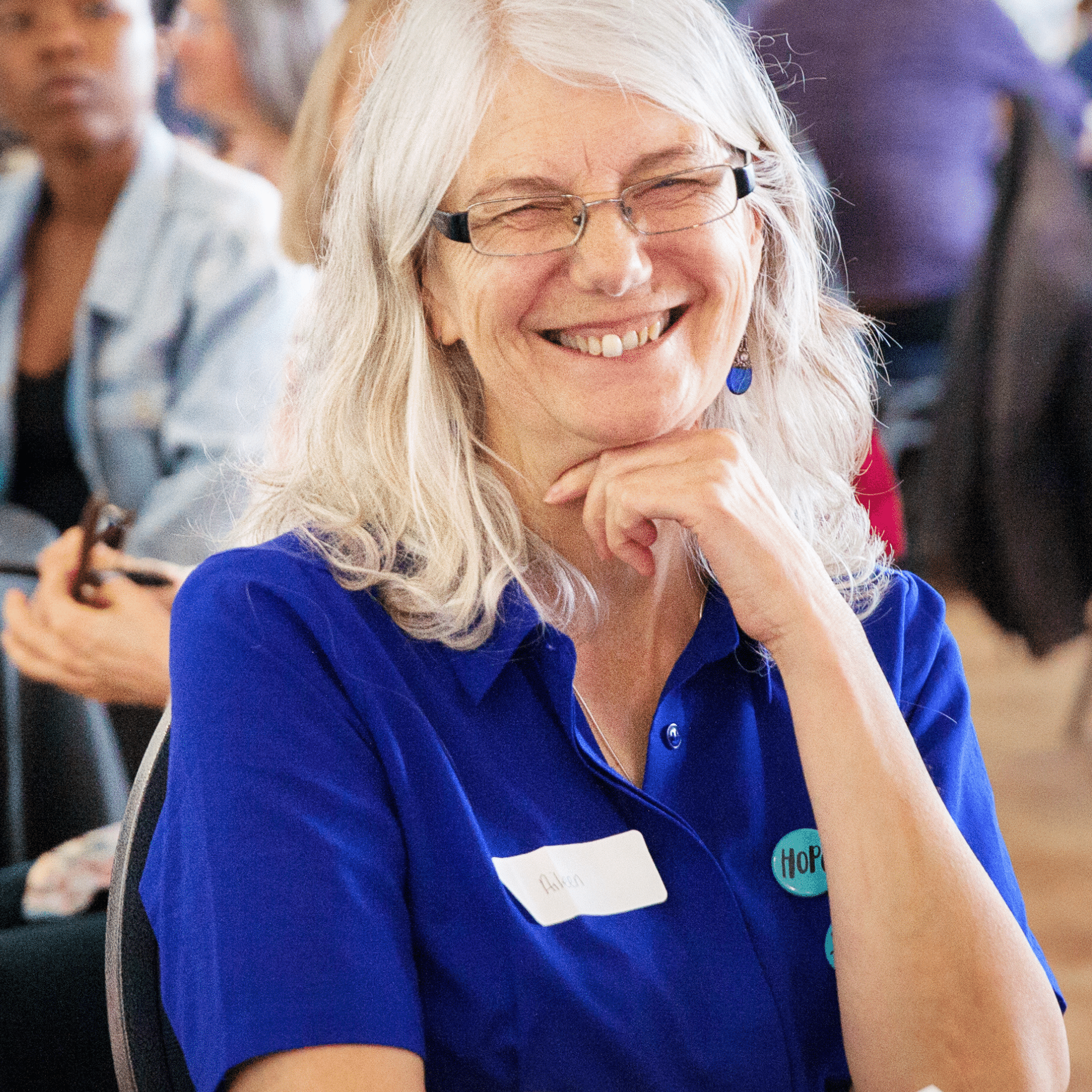
Aileen Edwards
Chief Executive
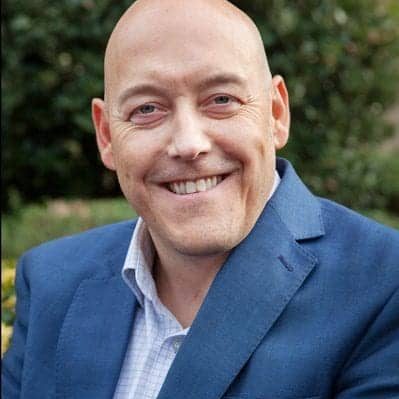
Kelvin Blake
Chair of the Board
"We've all got to have something to hold on to” – Tom's story
The above words come from Tom, one of our clients. His story reflects many of our values here at Second Step, from his outlook of hope and courage to his openness to building trust with Cat, his recovery navigator. We thought his inspirational story would be the perfect way to introduce the theme of our Impact Report this year: succeeding together.
Like many of our clients, Tom’s childhood experiences left him feeling like the world was a hostile place. At age 10, his life changed when he was sent away to school, an uncaring environment which marked him deeply. As an adult, he hid himself away for years, often too traumatised to get up in the morning, so distrustful that he rarely used services or claimed benefits. Tom shared how his life was impacted:

I left school at 16 with few qualifications and with this inability to deal with life. When you’ve got trauma then dealing with people is hard. I tried many times to live more ‘normally’, but each time it didn’t work. I ended up going back to living away from everyone in the woods."
But as much as Tom’s past was affected by a lack of supportive relationships, the relationships he built with Cat, with himself, and with Second Step within the system enabled him to take control of his future:

We all need a sense of being wanted, I had none of that which is why for years I was homeless. When I met Cat and Second Step, I was able to do more work on dealing with the trauma and my anger."
Tom worked with Cat gently unpicking the things that sparked his bouts of depression. They met regularly, building trust and trying different techniques, including focusing on things that interested him such as painting. Through Cat, Tom was given a grant to pay for art therapy and he joined a local art group. He has since taken on the role of volunteer tutor for the group, something he loves and looks forward to.
Listen to Tom share his story in the video below:
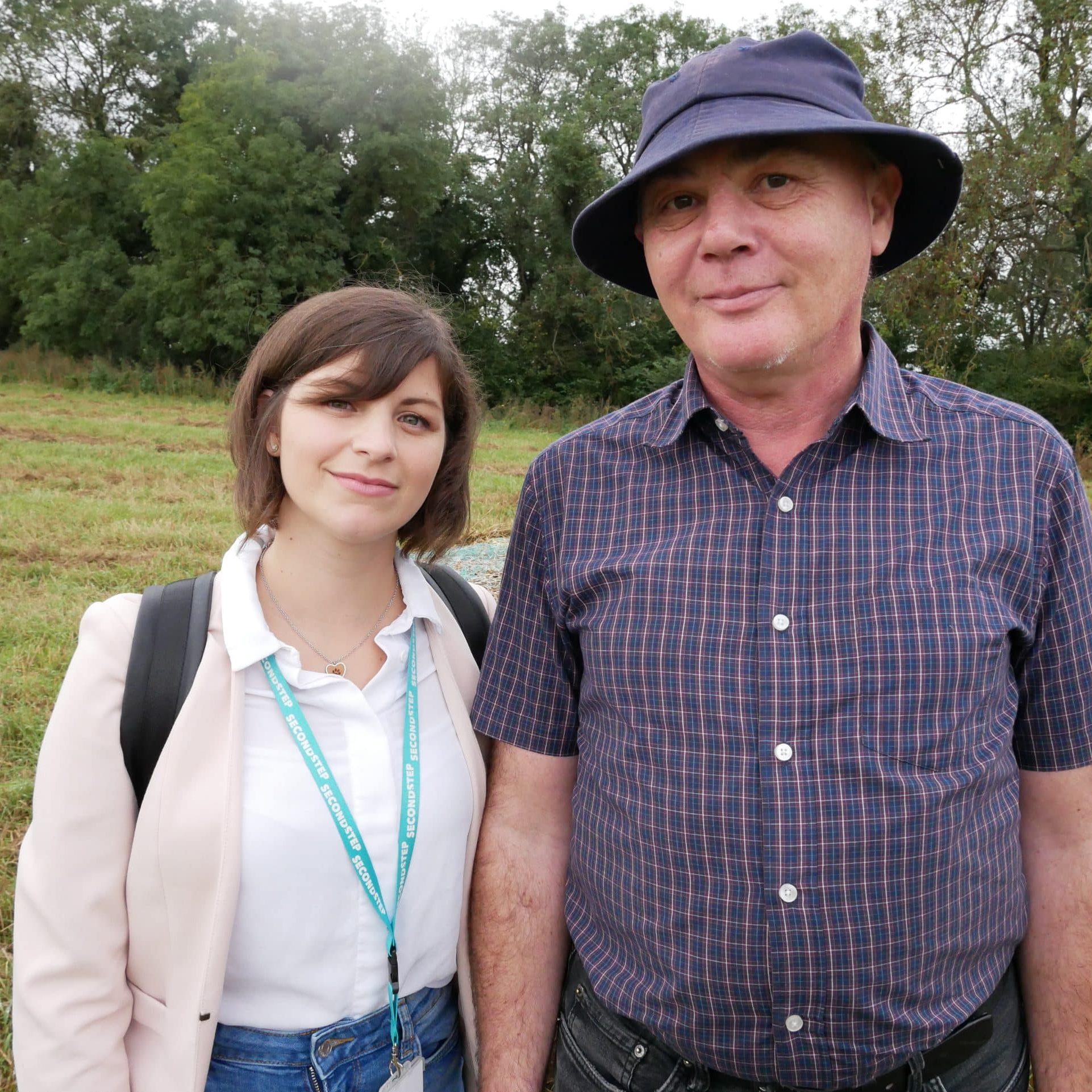
Cat and Tom
About Second Step's recovery navigators
"Our aim is to provide people with quick access to clinical, psychological and social support, close to home. A key part of this is bringing different partners together – NHS, social care and the voluntary sector - to meet peoples’ needs in our new MINT teams (Mental health and wellbeing Integrated Network Teams).
Second Step’s recovery navigators are in each of these teams offering individuals accessible, trauma-informed care and access to the wider support they need. Working as equal partners, recovery navigators are providing GPs, secondary and social care colleagues with expert advice to improve mental health in our communities. I look forward to seeing further impact of their work as we roll out MINTs across the region."
– Victoria Bleazard, Community Mental Health Programme Director, Bristol, North Somerset and South Gloucestershire (BNSSG) NHS
Collaboration works
Our value of Succeeding Together has helped us through tough times. It’s taught us that success comes when we collaborate, as a staff group and also as an organisation. By working together, and by working to our strengths, we’ve been able to continue to improve the lives of the many people we support.
Over the last year, we’ve prioritised our psychological, adversity and trauma-informed approach using it to help navigate the challenges and barriers faced by our clients and their carers as we support them to find their place in their communities. This approach, which we call our PAT approach, is informed by six principles:
- Safety
- Trust
- Choice
- Collaboration
- Empowerment
- Inclusivity
Alongside this, our addressing racism strategy took centre stage for our staff: working together to ensure stamping out racism is everyone’s business. As we look ahead to 2024 we will turn our focus on our clients to make sure every individual is valued and supported and has their needs met, regardless of race or ethnicity.
Externally our collaborative relationships are key with most of our services characterised by strong partnerships with other organisations. From the strong team ethic of the multi-disciplinary Link Team working with people facing rough sleeping and serious mental health issues in Bristol, through to the community mental health services we provide in Somerset as part of Open Mental Health, the trailblazing alliance between the voluntary sector organisation, the NHS and local council, collaboration and really listening to the client voice is hugely important.
What’s more, it is when we collaborate with the people who use our services, listen to their views and involve them in shaping the support we provide – that we see success, for them and for the communities in which they live.

How we work
Our collaborative approach follows our four priorities as outlined in our current three-year Strategic Plan:
Build a diverse and inclusive culture
Building on our Addressing Racism work, we ensure our services are inclusive and culturally informed.
Embed trauma-informed practices
Our approach means we are skilled in managing safe relationships and ensure our staff are well supported.
Actively value lived experience and client involvement
We promote coproduction and client involvement throughout the organisation.
Become an enabling organisation informed by good practice, learning and feedback
We learn from people’s experiences of our services, develop new ways of working, and strive to deliver high quality services throughout.
Stronger in partnership
From the very start, we have strived to be a good system partner, recognising that the everyday reality of our clients’ experiences, adversities and trauma requires a supportive coherent system that can provide interconnected support.
The Covid-19 pandemic further reminded us how quickly the threads holding our support systems and coping mechanisms together can unravel, particularly for people experiencing vulnerability and facing uncertainty and inequality in their lives.
It instilled in us a renewed determination to nurture our partnerships with other agencies across the sector to build a strong, connected, and community-minded foundation of support for our clients.
Here are six examples of how we work in partnership:
1. In partnership with local authorities
According to the figures from homeless charity Shelter, in January 2023, Bristol had the highest rate of homelessness in the region, with around one in 183 people living in a hostel, temporary accommodation, or on the streets.
Last year, on any given night, nearly 3,000 people were homeless in Bristol.
Against this backdrop, our work as a key partner in delivering Bristol City Council’s housing services pinpoints how the solutions to many complex challenges depend on a foundation of safety and security.
"Without Second Step I simply wouldn't be here" – Paul's story
Labour Councillor, Lord Mayor and former Second Step client Paul Goggin is known for never shying away from a frank discussion about mental health, and often opens up about his experiences of living with bipolar disorder, complex trauma and anxiety.
He, more than most, understands the significance of being able to set out on your mental health recovery journey with the reassuring weight of your own front door key in your pocket, of being able to trust that you have a safe space to retreat, pause and rest.
At our in-person staff Connect Together event in June, Paul shared his story via a video message with our staff, volunteers, clients and our Board.
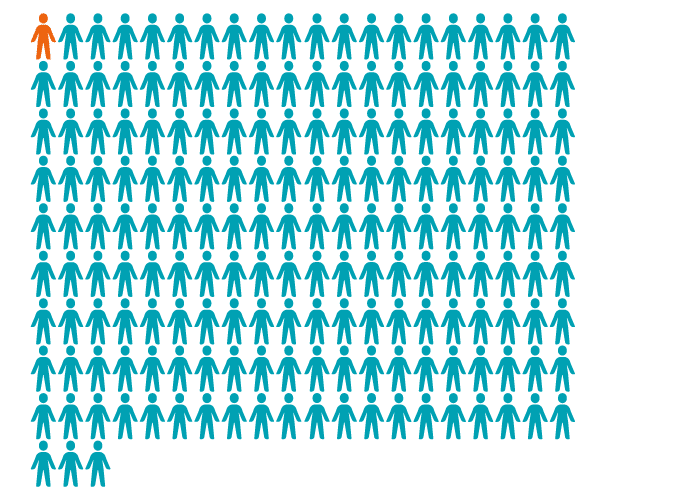
One in 183 people were living in a hostel, temporary accommodation, or on the streets in January 2023 (source: Shelter).
We heard how Cllr Goggin became homeless in 2005 and had to sofa-surf or sleep on the streets of Bristol. It was a combination of support from Second Step and Bristol City Council that enabled Paul to end his cycle of homelessness. Second Step initially helped him secure temporary accommodation while he waited to move into a Council property in South Bristol – a home he lives in to this day.

Without Second Step, I simply wouldn’t be here. I wouldn’t have been able to turn my life around. And certainly wouldn’t be Bristol’s first citizen talking to you today from the Lord Mayor’s parlour." – Cllr Paul Goggin
2. In partnership for men's mental health
We have found that for many men, and people socialised as men, there can be many social barriers that leave them feeling isolated and unable to access mental health support. These include misconceptions that men ‘get on with things’, do not need affection, or should be able to cope with problems using logic rather than emotion.
In England, 75% of people who die by suicide are male, however, men only make up 36% of referrals to NHS talking therapies.
Research, such as this study by the Samaritans, shows how opportunities to engage with men – particularly middle-aged, less well-off men – are often missed, and that many men find they can only access support if they reach crisis. However, the two key things many men report are missing in their lives are meaningful connections and purposeful activity.
Through our partnerships with Bristol, North Somerset and South Gloucestershire Integrated Care Board (BNSSG ICB) and the Open Mental Health alliance in Somerset we seek to provide more integrated, tailored solutions for groups that are statistically at higher risk of suicide, such as men.
Here are two examples of the work we do to support men's mental health: the Stepladder project in Somerset and the Hope Project in Bristol
*source: ONS
Stepladder – Connecting men across Somerset
Working as a partner of the Open Mental Health alliance in Somerset, our Stepladder project aims to connect men across this traditionally rural county and encourage a network of safe spaces for men to talk, take part in activities, and reduce feelings of isolation.
People who decide they want to create positive change in their life can feel disconnected from their friends and family, particularly if mental health is not acknowledged within those relationships. Stepladder creates environments that allow men the space to explore their mental health with others who understand. These spaces do not have to revolve around talk, but activities where men can open up naturally without pressure.
"I truly feel that I have found my calling in life" – Warren's story
One of the ways Stepladder helps to connect men across Somerset is through the Winston Innovation Fund which provides grants up to £500 to groups and activities aimed at improving men’s mental health and wellbeing:
One group we have supported through the Innovation Fund is the Ark at Egwood. Warren started attending Ark a few years ago to support his mental health, and it was here he first discovered his passion for willow weaving.
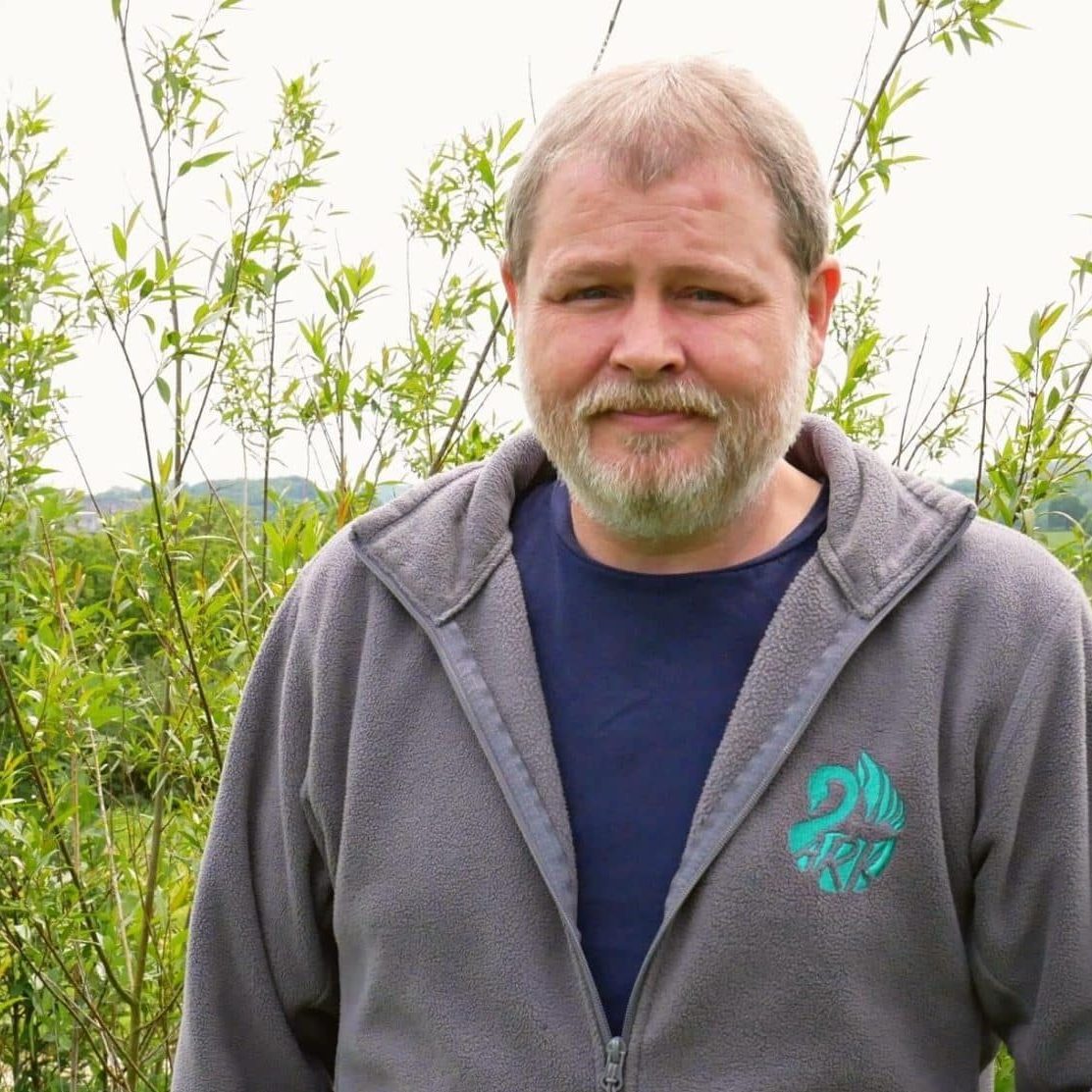
Warren, who found his calling in willow weaving work.

When I first arrived at Ark, I was struggling with depression. I felt isolated and very shy, and I didn’t enjoy interacting with people at all. However, over the past couple of years, the supportive community at Ark has helped me break out of my shell.
Working with willow takes my mind off things, and it becomes my sole focus. I only have to think about where the next piece goes and how the shape is forming. It helps me forget about my worries."
Now, with the Stepladder funding Warren is taking his hobby further than he ever thought possible:

Thanks to the funding we received from Stepladder, we were able to purchase more tools and plant our own bed of willow trees. We now have better quality willow available, both from our own farm and from commercial sources. This funding has made everything much more manageable and has allowed me to start my own willow weaving workshops to help other people find a passion and be social through a creative hobby."
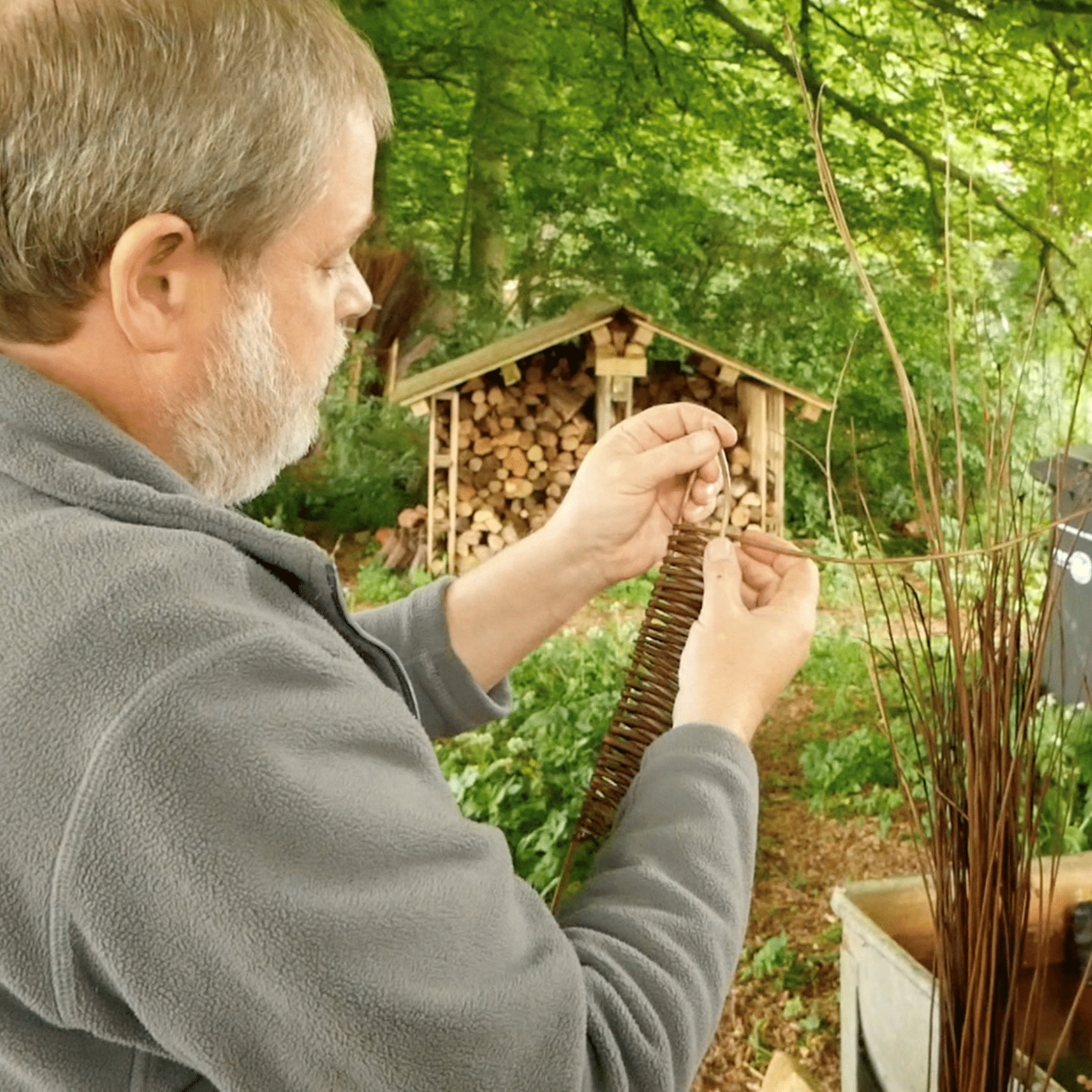
Before Warren started going to Ark, he worried about whether he would fit in. He knew that men often avoid talking about issues like this, so it was a big step out of his comfort zone. Fortunately, he found that everyone at Ark was as kind and accepting with him as they were with everyone else:

One of the key points I’ve realised is that until you participate in these groups and openly discuss your experiences with others, you may not realise that you’re not alone at all... I truly feel that I have found my calling in life, from creating Willow sculptures to engaging in traditional basket weaving.
Thank you all for allowing me to pursue this wonderful path."
The Hope Project – Suicide prevention in Bristol, North Somerset and South Gloucestershire
In Bristol, North Somerset and South Gloucestershire, the Hope Project demonstrates how reducing the burden of navigating support services gives our male clients more power to resolve the challenges facing their mental health.
Funded by BNSSG Integrated Care Board and delivered by Second Step, Hope offers both practical and trauma-informed emotional support to help men aged 30-64 manage the problems affecting their mental health such as housing, employment or addiction issues, as well as addressing their mental health symptoms.

When I first met up with my Hope Project worker I was determined that life was at the end and I was fed-up and she turned it around. Like I couldn’t get a bank account and she got me a bank account, came into the bank and helped me out, and if she weren’t there I wouldn’t have got it because I didn’t have the relevant ID. I blow everything up into a really big problem and she cut it down into digestible chunks, if you like to call it that, and helped me through all of it. It’s been great.” – Hope Project client
3. In partnership to support clients when it matters most
The Open Mental Health alliance in Somerset, together with the NHS Somerset Foundation Trust, NHS Somerset Integrated Care Board, Somerset Council and other voluntary organisations, has allowed us to extend the reach of vital services across Somerset.
Our shared mission to provide 24/7 support to all adults facilitates collaboration, meaning that however or whenever a client approaches us in Somerset, they can quickly be referred to services best placed to help.
Welcoming the BBC and ITV to Crisis Safe Space in Somerset
Our collaborative approach meant that over the Christmas period 2022, at a time when many services close or reduce their support, Crisis Safe Space in Bridgwater was able to provide out-of-hours support to any adult in crisis.
Crisis Safe Space was co-designed by people with lived experience of mental health problems to provide short-term crisis support in the community, relieving pressure on the NHS and providing a more comfortable experience for clients.
The BBC and ITV both visited Crisis Safe Space over the Christmas period to interview our colleagues and peer volunteers about their essential work:

These sorts of things may be highlighted a bit more at Christmas when you imagine lots of people are with their families, so I think it’s really important that this service is here. And we can tell people what we’ve struggled with, and that makes people feel less alone.” – Jo Poole, peer volunteer at Crisis Safe Space
Aileen Edwards and Juliet Lyon visit Crisis Safe Space
At a time when challenges in the sector are putting pressure on the viability of community services across the country, we are proud that our clients in Somerset can rely on services like Crisis Safe Space to receive the support they need in a warm community environment. In June, Second Step Chief Executive Aileen Edwards and Chair of Open Mental Health Juliet Lyon visited Crisis Safe Space to see the vital work our staff and volunteers are doing first-hand. Juliet Lyon gave us this feedback:

I was interested in the way in which the work has developed from the idea that there should be somewhere which never turns someone away to a nightly service seven days a week for people in crisis - a safety net for them and for the town and surrounding area.
It’s good to see a valued, integrated service where trust has developed with Somerset Foundation Trust, the ambulance service and Open Mental Health partners. It’s good to know too that some people can and do book themselves in. The reassurance that there are people you can trust and turn to must do much to avert a crisis.”
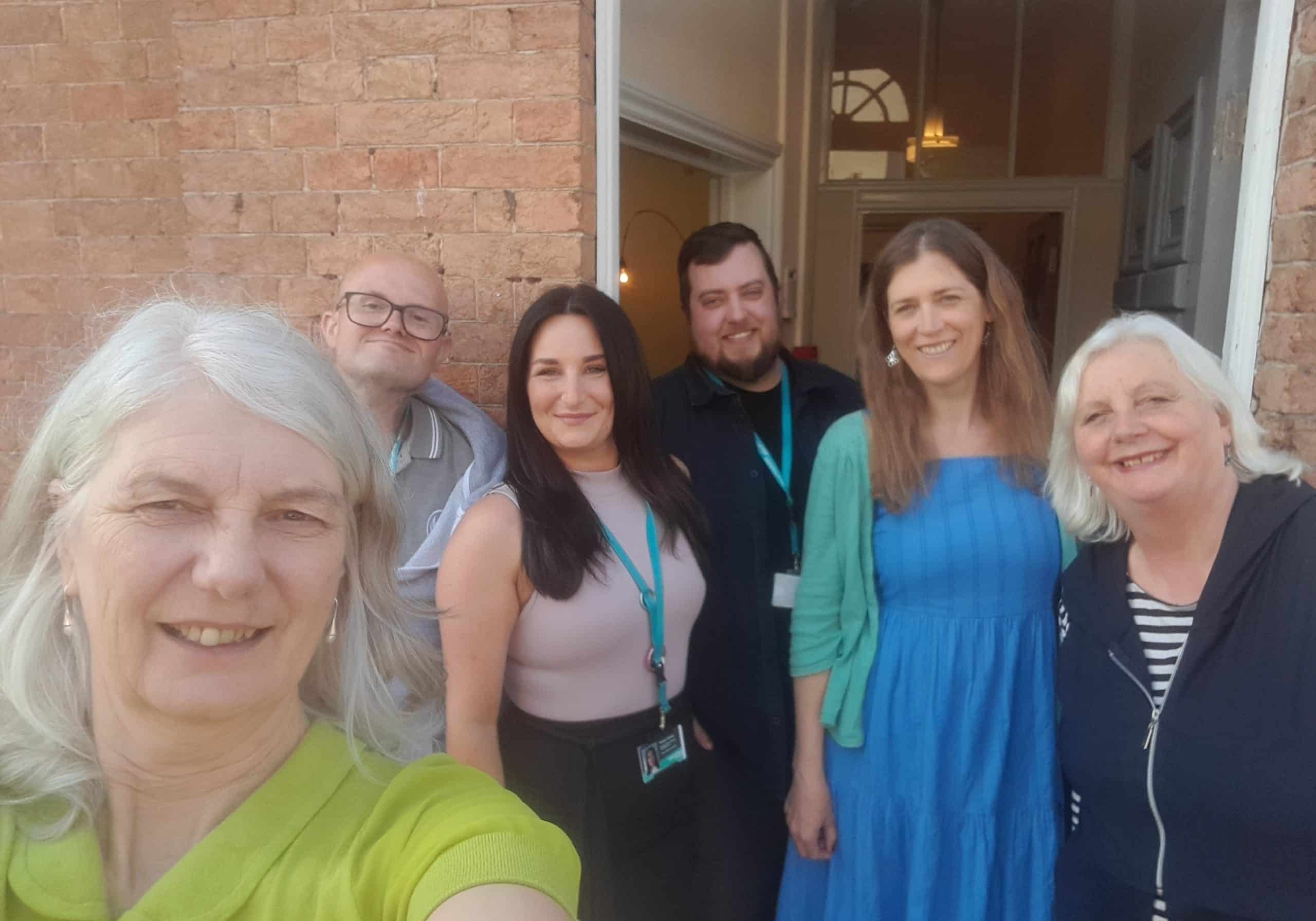
Photo from left to right: Second Step Chief Executive Aileen Edwards, staff members Chris Malin, Robyn Butler and Shane Weller, volunteer Jo Poole, and Open Mental Health Chair Juliet Lyon.
4. In partnership to close the gaps in community mental health services
2017 brought many changes to Rich Lee’s life – he moved to Bristol and started a new job, but within weeks he was struggling with his mental health:

I fell apart, I’d managed my depression and anxiety before that really well but suddenly I wasn’t able to manage at all. It felt like I was having lots of panic attacks all at once and I was having suicidal thoughts.”
Then Rich discovered our Bristol Wellbeing College and came along to one of our Wellbeing Cafés to meet us. From there he started attending workshops and courses, getting to know others, and gradually rebuilding his confidence and resilience along the way.
Now Rich is back in work as a Project Manager for environmental organisation Bristol City Leap, but his relationship with Second Step continues, and he is campaigning to raise money for mental health awareness with the support of his employer. He said:

What Second Step is doing is fantastic – not everyone has access to these services and they are massively important. People need to know Second Step can be found in a matter of seconds and can make a real difference.”
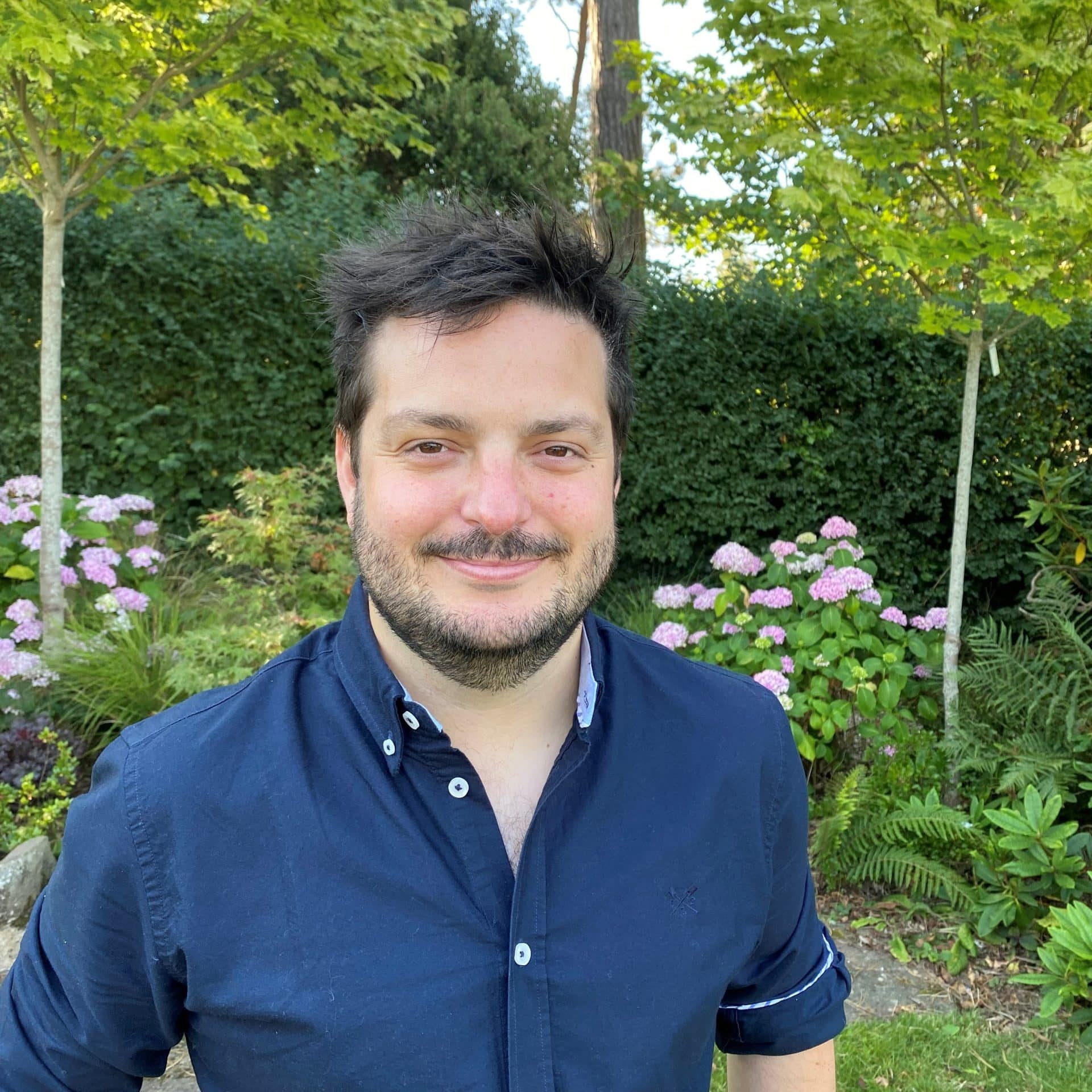
Rich, who benefitted greatly from Bristol Wellbeing College.
Flexible agreements with Bristol, North Somerset and South Gloucestershire ICB and Avon and Wiltshire Mental Health Partnership NHS Trust (AWP) allow Bristol Wellbeing College to extend their workshops and courses to every adult in Bristol. Crucially, learners do not need to get a professional referral or be in ongoing mental health support, filling a vital gap. Rich says:

Mental health services look after you when you’re critically ill but then when you’re out of crisis, they leave you and that's where the hole is that Second Step fills.”
5. In partnership with other voluntary organisations
Our partnerships with other voluntary organisations are built on the shared understanding that, by combining our experience and promoting our partners’ expertise, we can extend our collective reach, empowering more people through greater access to a wider range of mental health support.
Our collaborative approach particularly helps us reach people who statistically are less likely to access support and are at greater risk of losing their life through suicide, such as middle-aged men.
"I realised that actually I'm not alone" – Q's story
For Mental Health Awareness Week in May, Second Step client Q Lapido and Ian Bramley from Stepladder, our men’s mental health project in Somerset, went on the Somerset Emotional Wellbeing podcast to encourage more men to think about their mental health and raise awareness for the support.
Speaking to hosts Dr Peter Bagshaw and Dr Andrew Tresidder, Q highlighted why voluntary organisation alliances, such as Second Step’s partnership with Open Mental Health, are great at helping men find the support they need:

I felt alone, like it was only me going through these struggles, but through accessing different types of therapy I realised that actually I’m not alone”.
Only 36% of people who are referred to NHS talking therapies are men. So, projects like Stepladder, which focus on connecting men through purposeful activities, fill a major gap for men like Q:

I started off with art therapy. Now, I’m no artist, at the beginning I didn’t even think art therapy would be anything useful for myself, but one thing I found with my mental health is allowing myself to engage in the services that are around me.
Engaging with art therapy was really, really, really useful for me personally as an individual because it allowed me to get out all the thoughts and stresses, all the problems that were going on in my head throughout my whole entire life, and it allowed me to display them in an open, safe environment and process them at the same time.”
Listen to Q talk about his mental health journey below:
Ian Bramley, our Stepladder Steering Group Chair says:

When thinking about men and their mental health, it’s a generalisation but men don’t naturally talk about their emotions and how they are feeling. One of the things we have tried to do is create some context where men can do that. There have been some football teams set up, groups for men to join and sit round a campfire just to chat.”
To enable clients to explore their mental health within these spaces, Stepladder aims to challenge 'traditional' ideas about how men relate to each other within groups:

We want to encourage men to talk to a trusted friend but also to educate that if you are being talked to, to actually listen to the person. Many places where men meet, there is a lot of banter and a lot of flippant behaviour, which creates a negative space that is quite difficult for men to open up and express their feelings.” – Ian Bramley
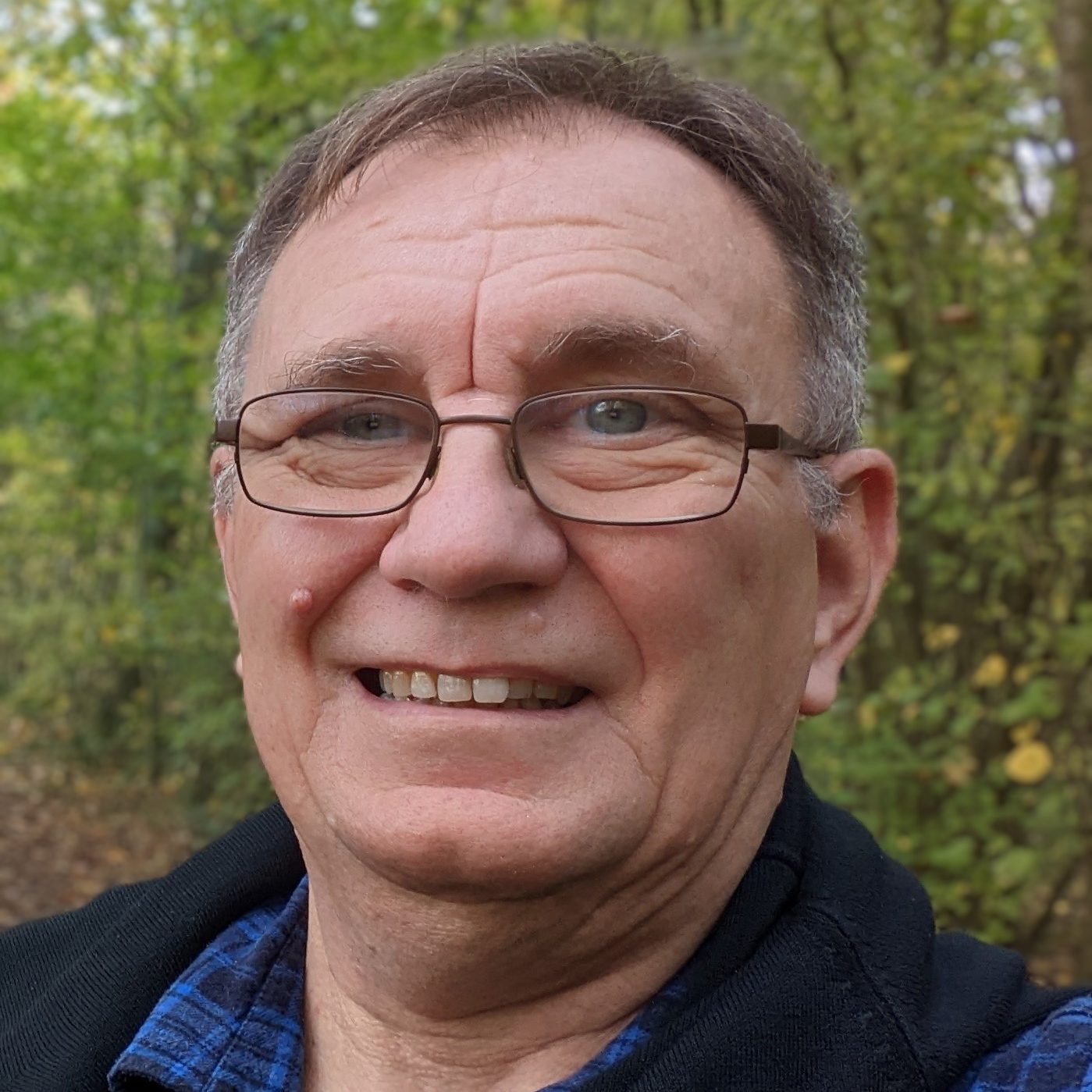
Ian Bramley, Stepladder Steering Group Chair
6. In partnership with our integrated care board (ICB)
Imagine being admitted to hospital miles away from your friends, family and community and, for some, remaining there for years.
This has been happening nationally for some mental health rehabilitation hospital admissions for a variety of complex reasons, including a lack of suitable local support services.
Rehabilitation placements have been costly both financially and psychologically, resulting in isolation and upset for many.
In Bristol, North Somerset and South Gloucestershire – as part of a national push funded by NHS England through ICBs to end these placements – Second Step, AWP and Bristol City Council (employing a social worker) have been working as part of a new team to help people return to their communities. We’ve been visiting people around the country, actively building relationships with the individual, the provider and local services to help make this happen.
Since this important project began 18 months ago, we have succeeded in returning a significant number of people to their local area. One woman, who spent seven years in an out-of-area hospital, is now back in her own home, and with specialist support has reconnected with her community and stayed out of hospital for more than a year.
Humanising complex needs
Over the past year, we have continued to embrace our role in promoting system change to improve the inclusivity and availability of services for clients with complex needs. Thanks to our trauma-informed approach and focus on lived experience voices, our understanding of the interconnected factors affecting a person’s mental health is greater than ever before. Our work includes:
Continuing to improve services through coproduction to empower our clients and embed lived experience voices.
Embedding trauma-informed practice in teams such as Step Together, our Somerset homelessness and complex needs service.
Launching The Link Team, a new multi-disciplinary team in Bristol to enable client-led support and bridge gaps between services.
Building on our work with Golden Key by continuing to partner with lived experience groups such as Independent Futures.
The Link Team – Bridging the gaps for clients with complex needs
The Link Team takes a multi-disciplinary approach to try to bridge the gaps in service provision, helping clients who face multiple disadvantage and are furthest from services access the support they need. It’s a service for people who are street homeless who experience severe emotional distress linked to a mental health problem and who face barriers accessing and engaging with support. Our key partners are AWP, St Mungo’s, Bristol City Council and Bristol Drug Project.
85% of our clients’ support is informed by multi-agency formulation assessments. Support is psychologically informed and individually tailored, incorporating the diverse perspectives of The Link Team’s wide range of expertise as well as our partnership approach and through close collaboration with Independent Futures’ lived experience expertise.
Clients can benefit from the team’s investment in developing consistent trusting relationships. This helps clients feel more involved in their support and respected as a whole person, a very different experience from the revolving doors or closed doors they may have been used to.

I feel respected as a person, as a human” – Link Team client
"I was asking the questions, he had the answers" – Craig's story
Craig, who was street homeless and experiencing mental health difficulties, was someone who was able to benefit from The Link Team’s client-led approach. Craig wanted to prioritise going to the gym over more task-based actions, such as going to the bank or filling in passport forms. One of the positive aspects of this was the confidence he felt in the gym, which he described as ‘his thing’. The gym membership costs were met through the client personal budget element of the service. Craig’s Link Team worker said:

Craig completely took the lead, made a workout plan, directed the session. It was a great bonding opportunity that strengthened the relationship and also created some equalising of power through role reversal. I was asking questions, he had the answers.”
Over time, the trust developed between Craig and his Link worker has been pivotal in him accepting an offer of accommodation and feeling able to settle there. He attended introductory meetings with a social worker, engaged with a mental health treatment requirement from court, and initiated his own health appointments.
Step Together – Embedding trauma-informed practice
Until recently, Kayleigh never thought she would be able to live independently. Her accommodation did not suit her needs, the trauma she’d suffered throughout her life meant finding support was difficult and she mistrusted her GP’s attempts to prescribe medication. Her mental health was low, causing her to self-harm – she could not consider therapy, it all felt too overwhelming.
Then she met Step Together, our homelessness and complex needs service commissioned by Somerset County Council, and with the support of Step Together Recovery Coach and Team Manager Rooth Langston-Hart, she was able to transform her life and move to a new home:

I never thought I’d be able to live independently - but with the support in place I really like my new home. My electric wheelchair fits in here no problem and I’m having new carpets fitted as well. I’ve even been able to get a dog which I’ve always wanted.”
Step Together in Somerset sets itself apart from other complex needs services with its commitment to working in a psychological, adversity and trauma-informed (PAT) way. PAT is embedded in the very core of the service with two full-time psychologists (one counselling, one forensic) employed to support clients at every stage of their recovery. Central to this approach is listening:

We have to go with the client’s agenda and move at their pace, whatever that looks like. Really hearing what they’re experiencing and how they see their world is the only way to finding a path to changing things for them.” – Rooth Langston-Hart, Step Together Team Manager
Step Together’s psychologists also work with the team to support staff, including providing one-to-one reflective practice on a monthly basis. When staff have the tools to manage their own challenges at work, the team can focus on improving its support for clients. In a 12-month period, no staff members left the team, providing consistency and stability for clients and for the team as a whole.
Kayleigh needed the support of more than 20 organisations and professionals to help deal with the consequences of her significant trauma. Step Together worked hard to co-ordinate this complex support system by building trust with everyone involved and by ensuring Kayleigh’s wishes were at the centre of every decision. Kayleigh is now in a position where she feels safe and secure enough to start therapy to address her trauma – and has been referred into Step Together’s therapy service.
Changing Futures – Changing the system to benefit everyone
Building on our learning from Golden Key, Changing Futures takes a leading role in promoting system change in Bristol for people with multiple disadvantage. Our belief is that if clients with complex needs encounter barriers in the system, it’s often the system that needs to change. We are influencing change for the person, the agency and for the system.
Our core ambition informed by lived experience, is to embed a My Team Around Me approach for people with multiple disadvantage. So we are working hard with partners, such as probation, voluntary sector partners, Bristol adult social care, to pilot and roll-out this approach, which we believe would be transformative for everyone.
Changing Futures' impact
Since June 2022, Changing Futures has supported 54 clients facing multiple disadvantage, reporting positive client experiences, including:
- Establishing a fully female team around a client who could not work with men due to trauma
- Supporting clients to stay in their accommodation when at risk of eviction
- Engaging with a client who obtained leave to remain 20 years after being trafficked into the country
- Supporting a client to collect evidence that they were a victim of criminal exploitation
- Supporting a client to leave her home for the first time in months.
Changing Futures balances its role and responsibility to promote system change with organisational interests, but evidence shows that an integrated, trauma-informed, co-produced, equalities approach ultimately benefits everyone. An Impact and Value for Money Assessment shows that while the costs to services increase in the first 12 months of engagement as people move from unplanned to planned engagement, costs then start to decrease rapidly, potentially bringing savings by the second year of engagement.

Line graph: Change in average service use costs per beneficiary over time
Looking ahead
As we move into 2024 we are enthusiastically embracing our cultural shifts to build an inclusive culture, embed our trauma-informed approach, value lived experience at every opportunity and create an enabling organisation
We’re determined in our mission to achieve these cultural shifts. What’s more, we believe that by developing our partnerships, and our system partnerships, we can achieve success for the people and communities we support. That’s why our collaborative approach will continue to be our top priority in 2024 and beyond.
We’re particularly excited about the new collaborative environment with the Integrated Care Boards and Integrated Care Systems which give us a real opportunity to work as part of the NHS to create lasting change.
We’re keen to play our part across the system as a strong, creative and values-led mental health voluntary sector provider to help shape this environment in new and exciting ways.
Do join us in our mission and get in touch, we’d love to hear from you.
Contact Jane Edmonds, Communications Manager:
Our services
We provide mental health and support in Bath and North East Somerset, Bristol, North Somerset, South Gloucestershire and Somerset. Click the following links to find out more about our services, projects and partnerships:
